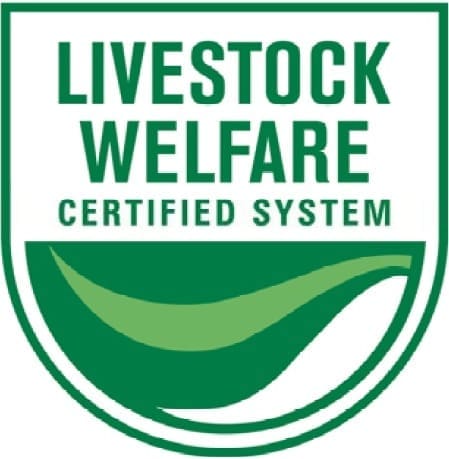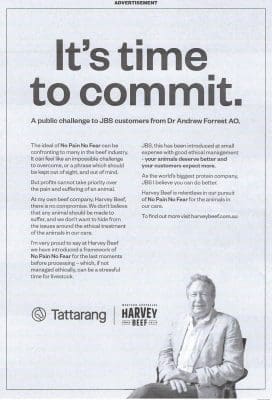WESTERN Australian mining billionaire and beef industry investor Twiggy Forrest has today mounted a surprisingly direct attack over rival export processor, JBS’s animal welfare credentials.
In full page advertisements appearing in metropolitan daily newspapers across Australia (see example on this page, click on image to enlarge) Mr Forrest mounts what he calls a ‘public challenge’ to JBS’s customers over the company’s animal welfare performance.
“The ideal of No Pain No Fear can be confronting to many in the beef industry,” it says. It can feel like an impossible challenge to overcome, or a phrase which should be kept out of sight, and out of mind. But profits cannot take priority over the pain and suffering of an animal.”
Mr Forrest claims that within his own beef company, Harvey Beef, there was ‘no compromise’.
“We don’t believe that any animal should be made to suffer, and we don’t want to hide from the issues around the ethical treatment of the animals in our care,” he says.
“I’m very proud to say at Harvey Beef we have introduced a framework of ‘No Pain No Fear’ for the last moments before processing – which, if not managed ethically, can be a stressful time for livestock.”
“JBS – this has been introduced at small expense with good ethical management. Your animals deserve better, and your customers expect more,” the advertisement reads.
As the world’s biggest protein company, JBS could do better, Mr Forrest asserts.
“Harvey Beef is relentless in our pursuit of No Pain No Fear for the animals in our care.”
Mr Forrest’s comments are specifically directed at “the last few moments before processing.” The Harvey Beef website (click here to access ), says the company’s end-to-end supply chain and commitment to always doing more in regards to No Pain No Fear meant customers “do not have to compromise their values when they choose a Harvest Road product.”
Among the website page’s ‘five freedoms’ underpinning animal welfare, the only ones specific to the slaughter stage include pledges to “provide an appropriate environment including shelter and a comfortable resting area,” and “ensuring conditions and treatment which avoid mental suffering.”
The aggressive advertising move comes only a fortnight after JBS and Mr Forrest were engaged in a struggle over control of Tasmanian salmon producer, Huon Aquaculture. Some have interpreted today’s unusual response as simply retribution over the outcome of the Huon deal.
JBS this afternoon issued a brief statement, quoting the company’s Australian chief executive, Brent Eastwood. It reads:
JBS unequivocally supports the concept of no pain, no fear and upholds the highest standards of animal welfare in this country.
Our JBS Animal Welfare policy calls out our commitment to the ‘Five Freedoms’.
We uphold our high standards of animal welfare through industry leading policy relating to responsible care for animals under our control, regular internal and external audits, extensive CCTV monitoring, training for livestock handlers, and livestock transport checks.
JBS Australia fully complies with Australian Animal Welfare Standards and is certified under the AusMeat – Industry Animal Welfare Certification Program (AAWCS) for livestock processing facilities.
Our production facilities are independently audited by the Federal Government, AusMeat and key customers to guarantee compliance with established animal welfare programs and standards.
We strive for continuous improvement in our welfare efforts through new processes, technologies and the implementation of standards that meet and often exceed regulatory requirements.
JBS has zero-tolerance for animal abuse from our own employees and third parties in our transport supply-chain, processing plants or feedlots.
As we have said previously, JBS will apply its uncompromising commitment to animal welfare and sustainability at Huon to build on the legacy of the Bender family in Tasmania.
Understandably, Tasmania has some of the most stringent environmental licence and regulatory standards in the world to protect its pristine waterways and we are committed to meeting and exceeding those standards and rigorously applying our continuous improvement approach.
Broader attack on industry?
Some industry stakeholders have interpreted today’s action as being an attack more broadly on the animal welfare credentials of the Australian processing industry.
Australian processing leads the world in animal welfare standards, and Mr Forrest’s comments reflected badly on his understanding of how the industry in this country operates, one senior industry contact told Beef Central this afternoon, on condition of anonymity.
“This is just the kids throwing the toys out of the cot,” the contact said, referring to JBS and Mr Forrest’s recent engagement over the Huon Aquaculture deal.
 Like all large Australian beef processors, JBS operates under the Australian Animal Welfare Certification System (AAWCS) platform.
Like all large Australian beef processors, JBS operates under the Australian Animal Welfare Certification System (AAWCS) platform.
Mr Forrest’s action ran the risk of cracking-open the Australian red meat processing industry, which has done magnificent work in setting up the third-party audited AAW standards, and the role of AusMeat in underpinning animal welfare performance, the contact said.
JBS, along with other major export processors Teys Australia and NH Foods, joined the new AAWCS program within days of its launch by the Australian Meat Industry Council back in 2013 (see earlier Beef Central story).
JBS also operates under parallel animal welfare processes such as major customer, McDonald’s animal welfare accreditation program, involving random animal welfare audits devised and managed by world-renowned animal behaviourist, Dr Temple Grandin. All yards, liairage and animal handling facilities at JBS plants have been developed under Dr Grandin’s guidance. Monitoring cameras are positioned throughout the JBS livestock facilities for animal welfare surveillance.
Broader reputational damage to industry?
Asked whether Mr Forrest’s comments were an attack, more broadly, on the track record of the nation’s beef industry, the Australian Meat Industry Council’s chief executive officer Patrick Hutchinson said ‘he hoped not.’
Both Harvey Beef, and certain parts of the JBS Australia business, are AMIC members.
“More broadly, the AAWC Scheme is in place in the overwhelming bulk of processing facilities around Australia – including JBS and Harvey,” Mr Hutchinson said.
He said that businesses were ‘always going to try to find a way’ to effectively differentiate themselves from their competitors.
“But our industry is absolutely shooting the lights out in its animal welfare performance, under the AAWC scheme. We absolutely stand by the performance of all plants operating under the program,” he said.
“We need to recognise that this is what we are judged against, as an industry. Large retail customers use the logo as part of their product messaging on packaging. It appears on export beef carton lids.”
“We need to recognise that businesses operating under the AAWCS are well and truly above and beyond what is required under the minimum standards for animal welfare in Australian processing. The program is regularly under review, as it is at the moment, having only just gone through a recent upgrade.”
“It is regarded as world’s best practise for animal welfare, and we stand by that – nationally, and internationally.”
Mr Hutchinson said if organisations wished to ‘present their credentials’ to customers with regard to welfare considerations, then necessarily the base-line they needed to start from was Australia’s world-leading AAWCS standards.
“How they go above and beyond that, is completely up to individual companies,” he said.
“The assumption we have drawn is that this (today’s advertisement) is more about trying to look at the voluntary systems that individual companies choose to undertake, to differentiate themselves from each other.”
“It has nothing to do with Australia’s world leading AAWCS program, of which both of the companies involved have all of their facilities operating under,” Mr Hutchinson said.

